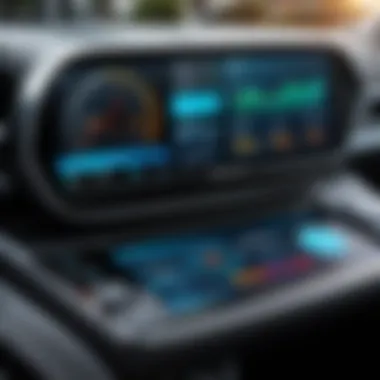Transformative Effects of Car Salesman Software


Intro
The automotive industry is experiencing significant transformation driven by technology. One crucial component of this shift is car salesman software. This software is changing how dealerships operate, impacting both sales processes and customer relationships. In an industry that relies heavily on personal interactions, enhancing these interactions through digital means is of utmost importance.
This article aims to explore the features, advantages, and challenges associated with car salesman software. It offers insights into the functionalities that support sales reps and managers alike, ensuring a more streamlined operation. Understanding these elements is essential for professionals who are considering technology investments in their automotive businesses.
Features Overview
Car salesman software encompasses various functional capabilities designed to improve sales performance and customer interaction.
Key Functionalities
These software solutions commonly include:
- Customer Relationship Management (CRM): This feature stores and organizes customer information, allowing salespeople to personalize approaches.
- Inventory Management: Helps in tracking vehicle stock levels, providing real-time updates to sales staff.
- Sales Automation: Automates mundane tasks such as follow-ups, enabling sales professionals to focus on closing deals.
- Reporting and Analytics: Offers detailed insights into sales metrics, helping identify trends and areas needing improvement.
- Lead Management: This tool assists in tracking leads through the sales funnel, ensuring timely and effective engagement.
Integration Capabilities
Choosing software that integrates seamlessly with existing systems is critical. Key integration features to consider include:
- Compatibility with other dealership management systems, such as finance and inventory software.
- Ability to connect with marketing platforms to enhance lead generation efforts.
- Mobile application access for sales teams on the go, which is vital for flexibility in today’s market.
Pros and Cons
Implementing car salesman software comes with its own set of advantages and disadvantages, which should be carefully evaluated.
Advantages
- Increased Efficiency: Streamlining processes saves time and allows for better focus on customer engagement.
- Better Customer Insights: Data collected through CRM features allows for tailored sales strategies.
- Enhanced Tracking: Sales automation functions help monitor leads and sales progress effectively.
Disadvantages
- Cost Implications: Initial investments and ongoing fees can be substantial, needing careful consideration.
- Learning Curve: Staff may require training to use the software effectively, which can temporarily impact productivity.
- Dependence on Technology: An over-reliance on software might lead to decreased personal interaction, which is still crucial in automotive sales.
"The ability to integrate sales processes with technology is not just an option; it is becoming a necessity in today’s competitive automotive market."
Overall, a broad understanding of car salesman software can provide insights that lead to informed decision-making. As this software evolves, it brings critical tools to the fingertips of automotive sales professionals.
Prolusion to Car Salesman Software
Car salesman software has become an essential tool in the automotive industry. This software streamlines the sales process, making it more efficient and responsive to customer needs. As the industry evolves, the integration of technology in sales practices is crucial. Understanding car salesman software provides insights into its significance in transforming interactions between dealers and customers.
Definition and Purpose
Car salesman software refers to a suite of applications designed to assist automotive dealerships in managing their sales operations. Its primary purpose is to simplify tasks such as lead management, customer communication, and inventory control. The software enables sales teams to track customer interactions, automate follow-ups, and maintain an organized system for managing leads. As a result, dealerships can enhance productivity and ultimately improve sales outcomes.
Historical Context
The evolution of car salesman software is closely linked to the advancement of technology in business operations. In the past, vehicle sales relied heavily on manual processes and paper-based tracking. This method was time-consuming and prone to errors. With the rise of digital technologies in the late 1990s and early 2000s, the automotive industry began to adopt software solutions that streamlined sales processes. The introduction of customer relationship management (CRM) systems paved the way for more effective interaction with customers.
Today, car salesman software encompasses a range of functionalities that include not only CRM but also analytics and inventory management. This evolution reflects broader trends within the automotive sector towards adopting a more customer-centric approach, where facilitating ease of access to information is paramount. The shift towards software solutions helps dealers remain competitive in a fast-paced market.
Key Features of Car Salesman Software
Car salesman software significantly shapes the automotive industry, becoming a fundamental resource for dealerships and sales teams. Understanding its key features provides essential insights into how this technology enhances operations, customer engagement, and overall business efficiency. The adoption of robust software solutions offers several advantages to automotive dealerships, directly influencing their sales processes and customer relationships.
Lead Management


Lead management is a critical component of car salesman software. This feature enables dealerships to organize, track, and nurture potential customers effectively. A streamlined lead management system captures leads from various sources, including website inquiries, social media interactions, and phone calls. By centralizing this information, sales teams can quickly access leads, categorize them based on their readiness to purchase, and assign follow-up activities.
This systematic approach improves conversion rates. It ensure no potential sale falls through the cracks. Additionally, integrating lead management with other features, like CRM tools, allows for tracking lead interactions. This includes how they engage with marketing materials. Consequently, sales teams can tailor their pitches to the specific needs and interests of each lead.
Sales Process Automation
Sales process automation significantly enhances efficiency in car dealerships. This feature streamlines repetitive tasks, such as generating quotes, sending follow-up emails, and managing appointments. By automating these processes, staff can focus on engaging with customers, ultimately enhancing the sales experience.
The automation of essential tasks ensures that the sales process remains consistent and reliable. This fosters a professional image of the dealership. Furthermore, automation can analyze sales patterns over time, which provides insightful data for future strategies. A dealership employing effective sales automation can react quickly to changing market conditions and customer demands.
Customer Relationship Management (CRM)
CRM features within car salesman software offer a comprehensive approach to managing customer interactions. This component is crucial for building long-term relationships with clients. It helps sales personnel to track customer preferences, purchase history, and follow-up schedules. Such data facilitates personalized service, making customers feel valued and understood.
An advanced CRM system will integrate well with lead management and sales automation, leading to a cohesive operational environment. This integration helps ensure that every salesperson has access to real-time information. As a result, customer experiences are improved, reinforcing brand loyalty. Additionally, effective CRM strategies can lead to increased referrals and repeat business.
Inventory Management
Managing inventory efficiently is essential for automotive sales organizations. Car salesman software features robust inventory management systems that allow dealerships to track stock levels, vehicle details, and pricing in real-time. This arrangement provides sales staff with up-to-date information, which is vital when engaging with customers.
By utilizing inventory management features, dealerships can analyze sales trends to make informed purchasing decisions. This means they can stock popular models and reduce overstock on less popular ones. Accurate inventory tracking also prevents customer dissatisfaction stemming from out-of-stock vehicles, as real-time data ensures availability status is always current.
Reporting and Analytics
Reporting and analytics are vital features of car salesman software that enable dealerships to gain insights into their operations. By collecting and analyzing sales data, businesses can evaluate performance metrics that affect profitability. This might include conversion rates, average sales cycles, and lead source effectiveness.
With these analytics, automotive businesses can identify patterns and trends in customer behavior. Data-driven decisions facilitate targeted marketing strategies and refined sales approaches. This analytical insight leads to improved resource allocation and fosters a culture of continuous improvement. Thus, reporting and analytics form a cornerstone of strategic growth in automotive sales.
"In the highly competitive automotive market, taking advantage of technology like car salesman software is not just beneficial; it is essential for success."
In summary, the key features of car salesman software — lead management, sales process automation, CRM, inventory management, and reporting and analytics — collectively refine the automotive sales ecosystem. These elements empower dealerships to deliver exceptional customer experiences, streamline operations, and enhance overall profitability.
Impact on Sales Processes
In the automotive sector, the efficiency of sales processes can determine the fate of dealerships and manufacturers alike. The implementation of car salesman software presents vital enhancements in how these sales processes function. It offers structured management of leads, smoother communication between sales personnel and potential customers, and presents data-driven insights that streamline transactions.
This section will delve into the specific elements of this impact, cherishing the benefits these technologies provide, and considering the challenges that may arise as businesses adopt them. These improvements encapsulate not only profit maximization but also an elevated customer experience, which is crucial in today's competitive market.
Streamlining Operations
Car salesman software plays a pivotal role in streamlining operations within automotive sales. By automating repetitive tasks, such as data entry and appointment scheduling, the software allows sales staff to focus on more crucial aspects of their roles. This optimization often leads to a more organized workflow, minimizing the potential for human error and reducing operational costs.
Furthermore, features such as lead tracking and follow-up reminders ensure that no potential sale slips through the cracks. This kind of structured approach enhances overall operational efficiency. Sales teams can now manage multiple leads simultaneously, thus ensuring that resources are utilized appropriately. The result is not just increased sales but also a more cohesive working environment where technology supports human efforts effectively.
Enhancing Communication
Effective communication is the backbone of any successful sales process. Car salesman software enhances communication through integrated tools that enable seamless interaction between the sales team and customers. Whether it is through automated email responses or live chat functions, the software fosters engagement at multiple touchpoints.
Additionally, centralized communication platforms allow for the consistent sharing of information among team members. Everybody stays informed about customer preferences and past interactions, which helps in tailoring discussions and offers to individual needs. Enhanced communication leads to higher customer retention rates and fosters loyalty, as both parties feel understood and valued.
"Seamless communication elevates customer experience and drives sales efficiency."
Reducing Time-to-Sale
Time-to-sale is a critical metric in the automotive industry. Car salesman software can significantly reduce this time. By automating lead nurturing processes and providing instant access to sales data, sales teams can make informed decisions quickly. Fast responses can be the difference between closing a deal or losing a customer to competitors.
Additionally, by using advanced analytics, the software identifies which leads are most likely to convert. This prioritization helps sales teams focus their efforts where they are most likely to generate results. Lowering the time-to-sale not only accelerates business growth but also enhances the overall satisfaction of customers who value efficiency in their purchasing journey.
Customer Engagement and Satisfaction


Car salesman software significantly influences customer engagement and satisfaction within the automotive industry. As buying patterns evolve, customers expect personalized services and efficient communication. Modern car buying has shifted from a linear path to a more fluid process where potential buyers often research online before visiting a dealership. This makes tailored engagement crucial for retaining interest and ultimately securing sales.
The software provides tools that allow dealers to understand their customers better. By recording customer preferences, behaviors, and feedback, dealerships can create focused marketing strategies that pique interest and foster loyalty. Satisfied customers are more likely to return for future purchases and recommend the dealership to others.
Personalized Experiences
Personalized experiences in the automotive sector are vital. Customers appreciate when their unique preferences are acknowledged. Car salesman software tracks individual buyer data, allowing for personalized marketing and sales approaches. For instance, if a customer frequently browses electric vehicles, targeted promotions or communications related to that interest can be sent directly.
Such tailored experiences lead to higher engagement rates as customers feel valued. Moreover, personalization extends beyond initial purchases. Follow-ups can be customized to check on customer satisfaction or to offer services related to their purchase.
Strategies for achieving personalization include:
- Customer Profiles: Collecting data on past purchases and preferences.
- Customized Communications: Sending targeted emails or messages based on interest.
- Loyalty Programs: Implementing rewards for repeat customers encourages ongoing interaction.
Feedback Mechanisms
Feedback mechanisms are essential for understanding customer satisfaction. Car salesman software can incorporate tools for gathering feedback on various aspects of the buying experience. Surveys, post-sale follow-ups, and social media monitoring provide insights into what customers appreciate and what needs improvement.
A strong feedback system helps dealerships stay attuned to customer needs. By promptly responding to feedback, businesses can make quick adjustments. This responsiveness is critical in maintaining high satisfaction levels.
Key components of effective feedback mechanisms include:
- Surveys: Simple forms sent via email after a sale.
- Social Media Listening: Monitoring brand mentions to gauge public sentiment.
- Incentives for Feedback: Offering discounts or rewards for completing surveys encourages participation.
"The success of any customer engagement strategy lies in adapting to feedback and evolving continuously."
In summary, customer engagement and satisfaction are driven by personalized interactions and effective feedback mechanisms. Car salesman software plays a crucial role in implementing these strategies, ultimately leading to enhanced customer loyalty and increased sales.
Choosing the Right Software
Choosing the right car salesman software is crucial for automotive businesses looking to enhance their sales operations and customer interactions. The effectiveness of any software largely depends on its alignment with the specific needs and dynamics of the business. When selecting a tool, companies must consider several factors that may significantly influence their overall performance and profitability.
Assessing Business Needs
Understanding business needs is the first step in the software selection process. Each dealership has its unique processes, challenges, and objectives. A comprehensive needs assessment entails evaluating current workflows and identifying areas requiring improvement. Each feature of the software, from lead generation to inventory management, should address a specific need within the organization. Gathering feedback from the sales team can provide insight into daily challenges, facilitating a more tailored solution.
Integration with Existing Systems
Integration capabilities are another vital consideration when selecting car salesman software. Many dealerships already use several systems, such as accounting software, customer relationship management tools, and inventory databases. Ensuring the new software can seamlessly integrate with existing systems promotes efficiency and data consistency. A lack of proper integration may lead to data silos, where information is trapped in specific systems, ultimately hampering operations. Therefore, potential software must be evaluated based on its compatibility with current tools to avoid disruption in the dealership's operations.
Cost Considerations
Cost considerations can not be overlooked. Software prices can vary widely depending on features, user licenses, and support services. Businesses need to factor not only the upfront costs but also long-term expenses such as maintenance and upgrades. A cost-benefit analysis can be useful here. It allows businesses to weigh the anticipated benefits of the software against its costs. Companies should also consider how the investment will impact sales and customer satisfaction over time.
User Experience and Interface
The user experience is a critical factor influencing the successful adoption of any software. A user-friendly interface improves staff productivity and encourages widespread use among team members. Complicated systems can lead to frustration and low engagement, defeating the software's purpose. Testing the interface through demos or trial periods can provide valuable insights regarding usability. A well-designed software solution should simplify tasks while allowing for adaptability to the dealership's specific selling techniques.
"The right software can be an invaluable ally, enhancing efficiency, productivity, and customer satisfaction where it truly matters."
In summary, choosing the right car salesman software involves carefully assessing business needs, ensuring integration with existing systems, considering costs, and focusing on user experience. A strategic approach will help dealerships select software that not only meets their current demands but also supports future growth.
Case Studies and Real-World Applications
Examining case studies and real-world applications of car salesman software serves a crucial role in understanding its actual effectiveness and transformative power within the automotive sector. By looking at specific implementations, businesses can glean valuable insights into the software's practical benefits and pitfalls. This section identifies the traits of successful deployments, which can guide companies interested in adoption. Additionally, lessons drawn from these case studies can illuminate the common challenges organizations face during implementation, fostering a more informed decision-making process.
Successful Implementations


Numerous car dealerships have leveraged salesman software to enhance their operations. For instance, AutoNation adopted the SalesForce Dealer Management System (DMS) to integrate their customer relationship management with sales processes. This implementation facilitated a seamless approach to track leads and manage customer interactions more effectively.
In another case, the dealership CarMax utilized the VINsolution software, which allowed for better inventory management and quicker access to vehicle information. By streamlining their operations, CarMax reported a significant increase in customer satisfaction due to improved service speeds and personalized experiences.
Benefits observed from these examples include:
- Greater overall efficiency in sales processes
- Enhanced communication among staff and customers
- Increased ability to retain and nurture customer relationships
Lessons Learned
While many organizations have successfully implemented car salesman software, several common lessons emerged from their experiences. Many businesses found that proper integration with existing systems is paramount. Without this alignment, data silos can emerge, leading to a fragmented understanding of customer relationships.
Moreover, training employees on new software was frequently cited as a critical step. Underestimating the necessity of thorough training can impede adoption and diminish the software's value. Some dealerships also discovered the need for ongoing tech support and updates, ensuring that the software remains effective and relevant in the ever-changing automotive landscape.
Key lessons include:
- Prioritize integration with current systems
- Invest time and resources in staff training
- Ensure ongoing technical support is available to address issues promptly
"The implementation of software solutions alone does not guarantee success; it is the strategic approach to integration and training that ultimately drives value."
Analyzing these case studies and lessons learned provides a roadmap for other dealerships contemplating similar paths. As the automotive industry continues to evolve, the real-world applications of car salesman software will play an increasingly vital role in shaping effective sales strategies.
Future Trends in Car Salesman Software
The evolution of car salesman software is guided by technological advancements and changing consumer expectations. Understanding future trends in this domain is crucial for industry stakeholders, as it shapes sales strategies and business operations. Key elements include the integration of artificial intelligence, mobile solutions, and cloud technologies. These trends can provide substantial benefits, such as improved efficiency, personalized customer experiences, and data accessibility.
AI and Machine Learning Integration
AI and machine learning are increasingly becoming essential components in car salesman software. They enable systems to analyze vast amounts of data and extract actionable insights. For instance, predictive analytics can help foresee customer behaviors based on past interactions, allowing sales teams to tailor their pitches more effectively. Moreover, automation features powered by AI can streamline repetitive tasks, freeing up valuable time for sales personnel.
Businesses adopting AI tools can expect to witness a higher conversion rate. The software’s ability to suggest potential leads based on patterns enhances opportunities for upselling and cross-selling.
"AI-driven insights can enhance decision-making processes and optimize customer engagement."
Mobile Solutions
The demand for mobile solutions in car dealership operations is on the rise. Smartphones and tablets empower sales teams to access software on the go. This flexibility enables sales professionals to engage with customers even outside the dealership, offering immediate responses to inquiries.
Mobile platforms can support features like virtual vehicle tours, inventory checks, and instant quotes. This accessibility enriches the customer journey, making the buying process more convenient and seamless. Furthermore, mobile solutions facilitate real-time communication among team members, ensuring that everyone is aligned on sales strategies.
Cloud-Based Solutions
Cloud computing is transforming how dealerships manage their car salesman software. Cloud-based solutions provide the scalability that traditional systems often lack. Dealerships can easily update features and access new functionalities without needing extensive on-site infrastructure.
These solutions also promote collaboration, as data can be shared across departments and locations in real time. This ensures that the sales team has up-to-date information, which is vital for effective decision-making. Additionally, cloud solutions typically require lower upfront investments, making them financially attractive. Companies can pay for what they use, allowing for more efficient resource allocation.
In summary, the future of car salesman software is highly influenced by technological trends. Adopting innovations like AI, mobile access, and cloud computing can lead to improved operations and customer experiences in an increasingly competitive automotive market.
End
The conclusion of this article synthesizes the insights drawn from the exploration of car salesman software and its influence on the automotive industry. Understanding the significance of this topic is vital for automotive professionals looking to thrive in an increasingly digital marketplace. Car salesman software helps sales teams enhance efficiency, streamline communication, and improve customer satisfaction, ultimately leading to increased sales and profitability.
Summary of Findings
In examining the impact of car salesman software, several critical findings emerged:
- Automation and Efficiency: Software solutions automate various sales processes, reducing manual workload and allowing sales teams to focus on building relationships with customers.
- Enhanced Customer Experience: Personalization and timely engagement have become achievable through CRM integration. This ensures that potential buyers receive tailored services and support.
- Data-Driven Decisions: Reporting and analytics functionalities enable dealerships to make informed decisions based on real-time data, focusing on what works and what doesn’t in their sales strategies.
These features not only boost productivity but also contribute significantly to a company's competitive advantage.
Final Recommendations
For businesses considering car salesman software, it is crucial to take the following factors into account:
- Assess Business Needs: Identify specific requirements that align with your dealership's operational goals. Understand your workflow to optimize software capabilities.
- Integration with Existing Systems: Ensure the new software can integrate seamlessly with any current platforms such as inventory management or accounting software to avoid disruptions.
- Cost Considerations: Evaluate the total cost of ownership, including subscription fees, training, and ongoing support, to ensure the software fits within your budget without sacrificing quality.
- User Experience and Interface: A user-friendly interface is crucial for ensuring quick adoption by the sales team. Test the software to see if it meets usability standards.







